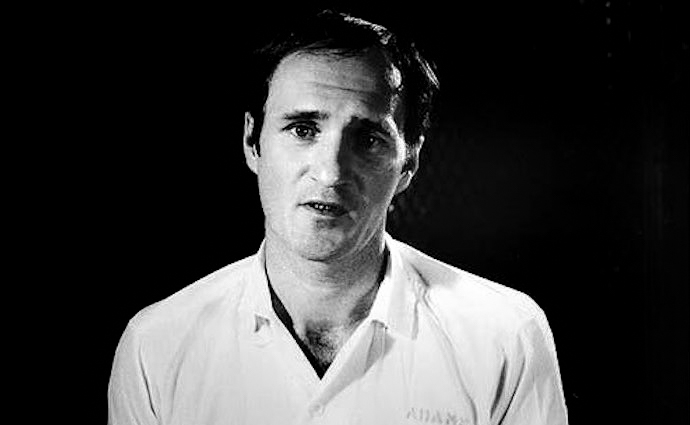The "thin blue line" is a term that typically refers to the concept of the police as the line which keeps society from descending into violent chaos.
The film is the result of a 30-month investigation by Errol Morris, one of America’s strangest and most brilliant documentary filmmakers, who sometimes jokes that he is not a “producer-director” but a “detective-director.” Morris originally went to Texas to do a documentary on Dr. James Grigson, a Dallas psychiatrist nicknamed “Doctor Death” because in countless capital murder cases over 15 years he has invariably predicted that the defendants deserved the death penalty because they were sociopaths who would certainly kill again.
“Adams told me he was innocent,” Morris remembered recently at the Toronto Film Festival, “but everybody in prison tells you they are innocent. It was only after I met David Harris that I began to suspect that the wrong man had been convicted of murder.” Although “The Thin Blue Line” assembles an almost unassailable case for Adams and against Harris, it is not a conventional documentary - not a feature-length version of one of those “60 Minutes” segments in which innocent men are rescued from Death Row.
Although he makes documentaries, Morris is much more interested in the spaces between the facts than with the facts themselves. He is fascinated by strange people, by odd word choices and manners of speech, by the way that certain symbols or beliefs can become fetishes with the power to rule human lives.
Morris’ first film was “Gates of Heaven” (1978), which I believe is one of the greatest films ever made. Ostensibly a documentary about two pet cemeteries in Northern California and the people who owned them, it is in fact one of the most profound, and funniest, films ever made about such subjects as life and death, success and failure, dreams and disappointments, and the role that pets play in our loneliness. Although “Gates of Heaven” has never failed to fascinate the approximately 50 audiences I have seen it with, it has never reached large numbers of people because of its subject matter; people think they don’t want to see a movie about pet cemeteries, and only enthusiastic word-of-mouth has kept the movie alive (it is only recently available on home video).
Morris has assembled many of the key witnesses in the case, including Adams, who seems passive and defeated about the fate that deposited him in a life sentence for murder, and Harris, who talks wonderingly about the fact that a person’s whole life can be changed because they were in the wrong place at the wrong time.
“Is Randall Adams an innocent man?” Morris asks Harris.“I’m sure he is.” “How can you be sure?” “Because I’m the one that knows.” Morris’ visual style in “The Thin Blue Line” is unlike any conventional documentary approach. Although his interviews are shot straight on, head and shoulders, there is a way his camera has of framing his subjects so that we look at them very carefully, learning as much by what we see as by what we hear.
https://www.rogerebert.com/reviews/the-thin-blue-line-1988
Release date: August 25, 1988 (USA)
Director: Errol Morris
Screenplay: Errol Morris
Awards: Edgar Award for Best Motion Picture Screenplay, National Society of Film Critics Award for Best Non-Fiction Film
Producers: Mark Lipson, Gary T. McDonald













.jpg)